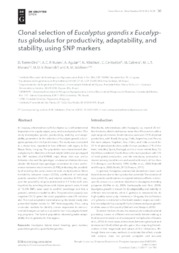Clonal selection of Eucalyptus grandis x Eucalyptus globulus for productivity, adaptability, and stability, using SNP markers.
Clonal selection of Eucalyptus grandis x Eucalyptus globulus for productivity, adaptability, and stability, using SNP markers.
Author(s): TORRES-DINI, D.; NUNES, A. C. P.; AGUIAR, A. V. de; NIKICHUK, N.; CENTURIÓN, C.; CABRERA, M.; MORAES, M. L. T.; RESENDE, M. D. V. de; SEBBENN, A. M.
Summary: In Uruguay, reforestations with Eucalyptus sp. is of fundamental importance to supply paper, pulp, and wood production. This study investigates genetic, productivity, stability, and adaptability parameters in the selection of Eucalypts grandis x Eucalyptus globulus full-sib hybrid clones. The study was conducted in a clonal test, repeated in two different soils types, in Rio Negro State, Uruguay. The population was characterized phenotypically for diameter at breast height (dbh) and genotyped for SNP markers (EuCHIP60K chip). Mean dbh was similar between sites and the genotype?environment interaction was simple. We found high genotype correlation in clone performance between environments (0.708), indicating the possibility of selecting the same clones for both study locations. Mean heritability between clones (0.724), coefficient of individual genetic variation (10.9 %), and relative variation (0.916), suggest the possibility of gains (estimated at 3.1 % for both sites together) by selecting clones with higher growth rates. A total of 15,196 SNPs were used to confirm parentage and test a genomic selection model for dbh. The predictive capacity was negative (-0.15) given the small population size (78 individuals). The most adaptable material among the tested study sites presented higher values for SNP heterozygosity. Thus, using molecular markers to identify clones responsive to environmental changes can act as a powerful tool in Eucalyptus breeding programs. The hybrid population showed greater adaptability than E. globulus for this region.
Publication year: 2016
Types of publication: Journal article
Unit: Embrapa Forestry
Observation
Some of Embrapa's publications are published as ePub files. To read them, use or download one of the following free software options to your computer or mobile device. Android: Google Play Books; IOS: iBooks; Windows and Linux: Calibre.
Access other publications
Access the Agricultural Research Database (BDPA) to consult Embrapa's full library collection and records.
Visit Embrapa Bookstore to purchase books and other publications sold by Embrapa.

